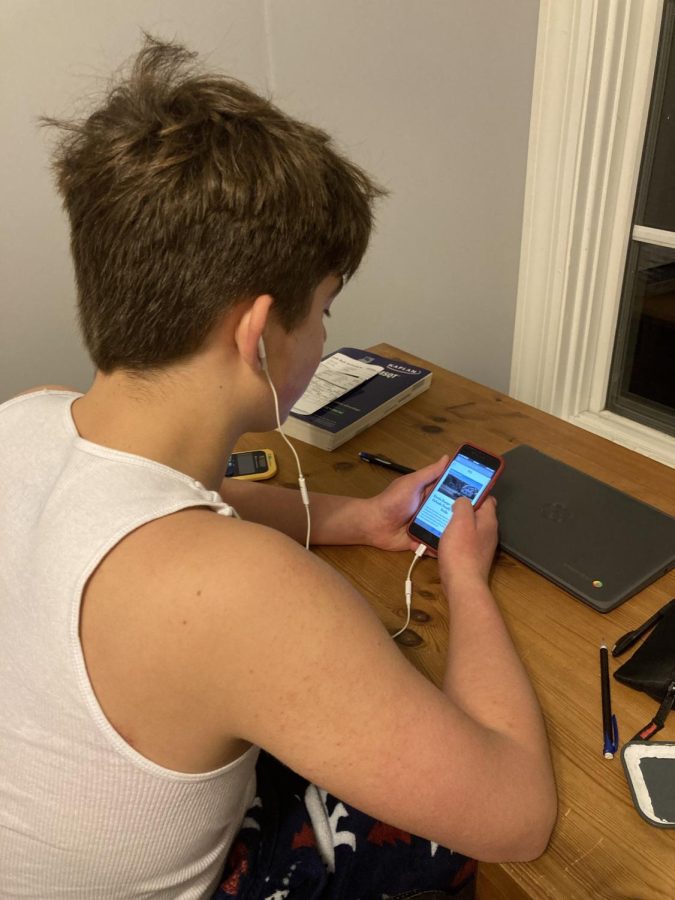Crisis Desensitization- A Generation That Struggles to Cope
When teenagers see constant violence and negativity every day on social media, it becomes normalized.
March 11, 2022
In the age of the internet, information travels faster than ever. With the constant presence of social media, anyone with a device has a voice, and in the current state of world affairs and politics, there is a lot to be said. This never-ending stream of information can be overwhelming as news feeds are flooded with the latest events of the day.
I feel like this has had the greatest impact on current teenagers, Gen-Z. Having grown up with devices, we have grown accustomed to this bombardment of news. However, this has deeper repercussions than initially anticipated.
It is no secret that the news typically isn’t the cheeriest content online. So rare is the good news that entire websites and accounts are made dedicated to giving people some positive stories. This stream of news negativity can have a detrimental effect on the human brain.
Constantly hearing about war, the pandemic and crime, the gravity of tragedy can begin to lose its significance. Being confronted with the worst of humanity all the time makes it extremely difficult to maintain a positive outlook on life.
So we cope.
There are plenty of coping mechanisms out there that can be used as healthy ways to relieve stress; however, this requires acknowledging the fact that there is stress to deal with. When the cause of the stress is just reading headlines on a screen, it can be challenging to realize that it has such a profound impact. As a result, people don’t take the time to work through their emotions, and they cope in subconscious ways that aren’t always healthy.
Humor is the main way that people tend to cope with hardship. This is especially seen in teenagers. We make jokes and laugh about it in the hallways, make some sarcastic comments, and in doing so, detach ourselves from the issues. This oftentimes isn’t even done consciously. We don’t even realize that we’re trying to work through some issues and stressors. It is so commonplace that it just seems like a natural part of conversation flow.
These jokes and sarcasm take away from the weight of situations, which is the point, to an extent, but it can be done so much that we don’t treat it with the proper respect that it deserves. We joke about the military draft while there are people on the front lines losing their lives. We joke about COVID-19 while people sit in hospital beds not sure if they’ll make it to the next day. Especially as kids who aren’t necessarily exposed to these traumatic events, it can be easy to make these jokes because there is a sense of security. The mindset of “it won’t happen to us” makes it easier to detach and make light of serious events.
However, this way of coping stems from farther back than just the start of the pandemic and the war in Ukraine. High schoolers have grown up hearing about death ever since we could understand what it meant. Being born in the wake of 9/11 and having conflict in the Middle East for the entirety of our adolescence, tragedy has become just another part of our childhood. It eventually just became background noise.
With this constant exposure has come a sense of desensitization when it comes to crisis. We remove so much seriousness from traumatic events that eventually, they don’t mean anything. We don’t know when to just sit in silence and let it sink in, because to do so would be leaving ourselves vulnerable to pain.
This disconnect from reality is especially exacerbated online, where it can already be difficult to comprehend things on a deep level. When we’re looking at how many people have died from COVID-19, all we see is a number ticking on a screen. Unless conflict seriously touches a part of our own life, it just seems like another thing on the screen, right next to our TV shows and Instagram posts.
Trying to figure out how to deal with this dilemma brings up the complex topic of global awareness and our duty as citizens. It may be beneficial for mental health to just log off of social media and not look at the news, but this is clearly a privileged experience as some people aren’t able to or can’t afford to just not pay attention. This conversation also brings up the point that we as citizens to some extent have the duty to be informed about our world, since we can make decisions that have a big influence on our society.
This topic is complicated and nuanced, and there is no one fix-all solution, but I encourage us as a society and as a generation to be more thoughtful about the content that we post when it comes to difficult world events and weigh the question: what is the real motivation behind the jokes we make about hardships?



Holly • Mar 11, 2022 at 9:46 am
Thank you for writing this piece on how we should be more considerate of talking about what’s going on in the world. I would be a hypocrite if I said I haven’t used unhealthy coping mechanisms in my life to help or turned away to Netflix when I saw some unsettling news online. But I’ve tried my best in some ways to take what I read or hear about seriously and when there is a chance I can help I try too. Anyway, to Laure Schulders this Opinion article you wrote has really struck a chord in me with how well it was written. Please continue to keep writing more and I hope you have a splendid senior year.